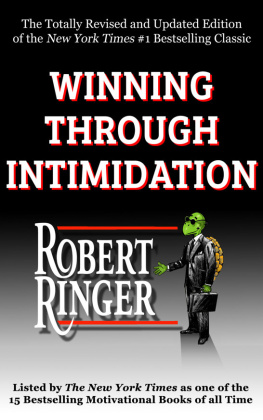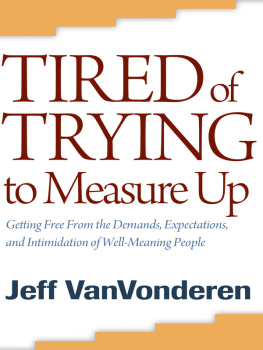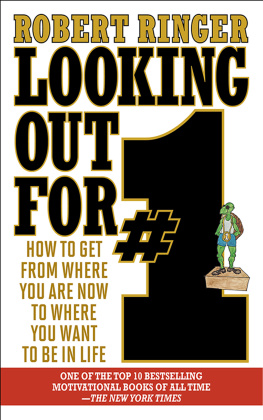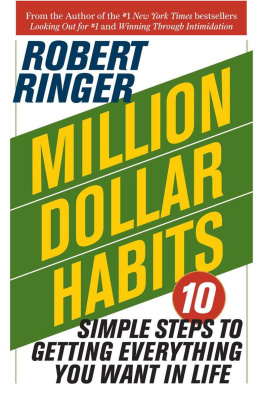WINNING
THROUGH
INTIMIDATION
Robert Ringer
www.robertringer.com
Copyright 1973, 1974, 2002, 2004, 2006, 2008, 2013 by Robert Ringer
All rights reserved. No part of this book may be reproduced in any form whatsoever, stored in a retrieval system, now known or to be invented, or transmitted in any form or by any means, electronic, mechanical, photocopying, recording, scanning, or otherwise, without the prior written permission of the author or publisher.
Manufactured in the United States if America.
ISBN 978-0-9724042-5-9 (eBook)
Robert Ringer is an American icon whose insights into life have helped more people transform their aspirations and goals into reality than perhaps any other author in history. For more than three decades, his works have stood alone as the gospel when it comes to conveying worldly wisdom to millions of readers worldwide.
He is the author of two New York Times #1 bestsellers, both of which have been listed by The New York Times among the 15 bestselling motivational books of all time. He is also the publisher of RobertRinger.com, where he combines philosophy, reality, and action in his trademark style that translates into tangible results for his readers.
Ringer has appeared on numerous national television and radio shows, including The Tonight Show, Today, The Dennis Miller Show, Good Morning America, ABC Nightline, and The Charlie Rose Show, and has made a variety of appearances on Fox News and Fox Business.
He also has been the subject of feature articles in such major publications as Time, People, The Wall Street Journal, Fortune, Barron's, and The New York Times.
Dedicated to the millions of resilient souls who took to heart Peter Finch's battle cry in the movie Network"We're mad as hell, and we're not going to take it anymore!"by adopting it as their mantra and drawing a line in the sand against the intimidators of the world.
Contents
| Chapter 1: |
| Chapter 2: |
| Chapter 3: |
| Chapter 4: |
| Chapter 5: |
| Chapter 6: |
| Chapter 7: |
| Chapter 8: |
| Chapter 9: |
| Chapter 10: |
| Chapter 11: |
| Chapter 12: |
| Chapter 13: |
| Chapter 14: |
| Chapter 15: |
| Chapter 16: |
| Chapter 17: |
| Chapter 18: |
| Chapter 19: |
| Chapter 20: |
| Chapter 21: |
Preface
Notwithstanding its rise to New York Times #1 bestseller status, the title of this book, Winning Through Intimidation, sparked a great deal of controversy over the years. I was often made aware of the fact that many people refused to read the book because they assumed it was about bullying your way to the top. For this very reason, many other peoplethose who actually read the bookinsisted that it was mistitled, because it was not, as the title seemed to suggest, a tome on how to get ahead by intimidating others.
As a result, for a number of years the title was changed to To Be or Not to Be Intimidated? And that, in turn, caused many readers to register complaints and adamantly state that they preferred the original title because it was more bold. So, I guess it's true that everything that goes around comes around, and here we are again, back to the original title. In any event, just to be clear, Winning Through Intimidation and To Be or Not to Be Intimidated? are one and the same.
That said, if you bought this book in the hopes that it might teach you how to get ahead in life by intimidating others, I'm afraid you've made a bad choice. If that's your aim, you might find The Communist Manifesto, Mein Kampf, or Mao Tse-Tung on Guerrilla Warfare more to your liking. As you will see on the following pages, To Be or Not to Be Intimidated? is a guide to defending yourself against intimidating people.
Be forewarned: More often than not, those who feign indignation over the mere mention of the word intimidation are the very people who are most likely to use it against you. So, make no mistake about it, what I have to say in this book bothers a lot of peopleespecially self-righteous, self-anointed saints who are masters at intimidating others. They would prefer that most people not understand that intimidation is a common thread that runs through every business situation and a crucial factor that decides the outcome of many of life's most important events.
At the top of the list of master intimidators disguised as (self-anointed) saints are chest-pounding critics, syndicated columnists, and TV commentators, ever on the alert for an opportunity to seize the moral high ground. Like public figures in all fields of endeavor, authors find it an annoying challenge to fend off their intimidating mischaracterizations and misleading comments.
What is a tortoise to do about such a relentless onslaught of distortion and truth-twisting, of having to listen to "the truth you've spoken twisted by knaves to make a trap for fools?" Ayn Rand offered perhaps the most rational solution for dealing with slanderers when she said, "Freedom comes from seeing the ignorance of your critics and discovering the emptiness of their virtue." Thankfully, I long ago adopted her advice, and highly recommend that you do the same with regard to those who would try to misrepresent your words or actions.
Introduction
The principles set forth on the following pages do not necessarily represent the way I or anyone else may wish the world to be, but the way it actually is. In other words, it is a work based on reality, particularly as it relates to human nature. Thus, the essence of the philosophy contained herein should serve you well regardless of how the world around you may change in the years ahead.
That's because, though technology continually changes, human nature remains constant. People, by and large, are pretty much the same today as they were in the times of Confucius, Buddha, Jesus, and Socrates, and it's a safe bet that they'll be pretty much the same 2,000 years from now. For example, Jesus, above all else, crusaded against hypocrisy. But today, 2,000 years later, can anyone seriously say they see evidence that hypocrisy is on the decline?
Judging from the way most people talk and act, one is led to wonder if a resistance to reality is genetically programmed into a majority of our species. Perhaps reality was only meant to be embraced elsewhere in our universe. However, unless you know how to build a spaceshipand fly itI would suggest that it would be much easier for you to join that small minority of people on Planet Earth who are vigilant when it comes to recognizing and acknowledging reality.
Unfortunately, most people choose to live in a world of delusions, stubbornly refusing to accept the unforgiving realities of life no matter how great the evidence to support such realities may be. Why? Because truth is often painful, and people simply do not like pain. My position, however, is that truth, by its very nature, is always preferable to falsehood, regardless of how unpleasant it may be. Self-delusion leads to certain failure, and failure leads to misery. What's so noble about promoting misery?
Sure, I sometimes think to myself that perhaps it would be easier to yield to the temptation to become an ostrich and simply hide my head in the sands of unreality. In the end, though, I always manage to pull myself back toward reality, because I'd rather go to my grave a battered realist than a bloodied ostrich. And rest assured that battering
Next page








